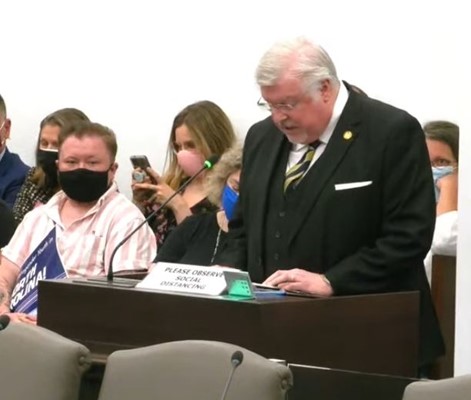
By Hunter Hines
Christian Action League
April 15, 2021
Fairness and physiology were the focus Wednesday as members of the House Judiciary 1 Committee began discussion of House Bill 358, Save Women’s Sports. Introduced by Rep. Mark Brody (R-Union) on March 22, the measure would prevent biological males from competing in female athletics.
“We have eons of human experience and countless thousands of research studies showing that there are biological differences between human males and human females,” Dr. Gregory Brown of the University of Nebraska told lawmakers. “Boys and men are taller, weigh more, have more muscle mass, have less fat mass and are bigger, faster and stronger than comparably aged and trained girls and women.”
He said males can run 15 percent faster, jump 15 to 20 percent higher and lift 30 to 60 percent more weight than females. Further, Brown said recent studies show taking testosterone suppressants and transitioning hormones for a full year doesn’t significantly decrease a man’s muscle strength, making it impossible for women to successfully compete against them.
Brown was one of four featured speakers urging passage of the bill. Others included power-lifter Beth Stelzer, who founded the grassroots organization Save Women’s Sports; Idaho Representative Barbara Ehardt; and accomplished Asheville cyclist Evie Edwards.
Stelzer said keeping men out of women’s sports is not about transphobia, religion or partisan politics, but is simply common sense. She said allowing biological males to compete against females will put an end to women’s sports. Edwards agreed, saying that women athletes are already being robbed of opportunities by trans athletes.
“This is not fair play and it is not ethical,” Edwards said. “Already we know women are underrepresented in sports. If we are forced to compete against males, the opportunities we have will disappear.”
For all those reasons, Rep. Ehardt encouraged Tar Heel lawmakers to follow Idaho’s lead and pass the legislation. She said she was not intimidated by ACLU lawsuits and that North Carolina should stand up for girls and women and the hard fought gains that Title IX brought female athletes beginning in the 1970s.
Following the four main speakers, the committee heard from 10 members of the public who opposed the bill, many of them parents of transgender children, and another eight who championed it. One of those was Charlie Rae, a Raleigh writer who said she experienced gender dysphoria as a child. Rae, who won numerous gold medals in taekwondo, said if a university allows biological males onto female teams, soon they will fill those teams and women will be pushed completely out without the ability to use Title IX to claim discrimination.
Another speaker, a father of three daughters, said the incentive for boys to claim to be girls to invade female sports will only grow as scholarships make the prospect of doing so more lucrative.
“Identities don’t play sports; bodies do,” he said. “The physiologically weaker sex will lose the ability to compete.”
While many of the bill’s opponents made emotional pleas based on their trans-children’s needs to be accepted and reap the benefits of playing a sport with their peers, supporters continued to remind them of the science that backs up the need for sex-segregated teams.
“To pretend that there are no biological or physiological differences between girls and boys, and women and men, is simply ignoring science and the truth,” said NC Family Policy Council President John Rustin.

Dr. Mark Creech, executive director of the Christian Action League, underscored the need for lawmakers to act on that objective truth.
“We cannot operate our many institutions, private or public, on what is largely subjective or anecdotal evidence. Although not always acknowledged, objective truth remains constant in every generation. And, it is not an attack on any group when we differentiate accordingly. In fact, fairness requires that we do so,” Creech said. “I am not of a minority race, neither am I poor – no matter how much I might believe or declare otherwise. Therefore, society in general, and the state specifically, does right not to concede to me certain advantages meant for a particular order. You would act no less reasonably by supporting this bill.”
Learn more about House Bill 358, which could come back before the committee for a vote as early as next week.
